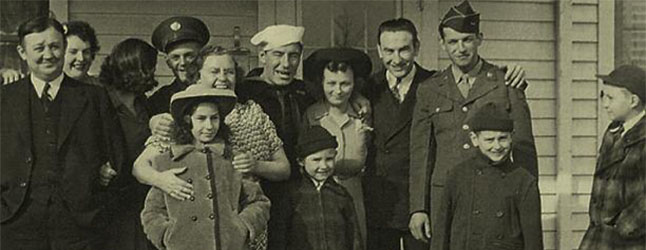By Thomas J. Gworek
(c) Connecticut Explored Inc. Spring 2010
Subscribe/Buy the Issue!
Born in Hartford in 1933 and raised in Wethersfield, Thomas J. Gworek remembers World War II as “the seminal event of my younger days.” In the following excerpts from a longer unpublished memoir, Gworek conveys the most vivid of his memories of life on the home front through “the eyes of a child who… never outlived the experience.”
The war started for me on a Monday morning in the second grade. I was eight years old. I have a vague memory of excitement in class that morning; a remembrance of children talking to each other in whispers and then someone saying to me, “Did you hear? The Japs bombed Pearl Harbor!” I had no idea what he was talking about. I gathered from the tension in the air and the hushed tones it was something serious and bad. I tried to look grave.
Shortly after this I heard that my uncle Al, who used to wrestle with me on the couch, was going to the Army. The great thing about it was that because people said he wouldn’t be back home for quite awhile I could have all his model plane collection. Boy was I happy. …
Then things began to happen that made me slowly realize that this war might be about more than getting my uncle’s model airplanes. … I couldn’t get rubber bands to fly those models. It seems the Japanese had captured the islands where we got these things, so they were no longer available and I was reminded when I whined about this that the rubber we had was needed for tires and life rafts for our servicemen. …
Strange names began to creep into the general vocabulary. Names like Bataan, Corrighador, Midway, Morocco, and Guadalcanal. Slowly the supply of new baseball cards dried up and was replaced by pictures of generals like MacArthur or Patton, and Admirals Nimitz, King, and Spurance. The cards were all of the same style; a large picture of the hero looking out sternly and in the background a battle of planes, ships, or cannons. There was no way we were going to lose the war with men like this leading us. …
Slowly, like the month of March after a long winter, the dark days of war seemed to lighten as the news from both fronts became more and more positive. … My father received letters from my uncle all throughout the war and they came more frequently now although still censored with the thick black line-outs of words and even sentences. One day two small boxes arrived from Europe filled with German emblems and armbands, souvenirs from the front. I tore into them looking for blood stains or a bullet hole to tell me they had been ripped off a fallen soldier in the field but they were all brand new, probably found in some over run supply depot. …
As a pre-teenage boy you could say that the end of the war was a let down. Overnight there were no more war bond drives and no more talk of fighting the enemy. The esprit de corps that infused everything we did dissipated and I missed that feeling that everyone was pulling together for a common cause. Uncle Al came home to find he no longer had a mother or father and that his girlfriend was no longer the woman he would marry. He found another girl, married, and had a wonderful family and typical middle class life, dying at the age of 89. He never talked about the war. When pressed he would only say that he and his buddies had a job to do—a rotten, stinking job, and they did it. …
The last thing I remember about the war before my life became obsessed with basketball, girls, and what I was going to do with my life, was the story of the freeing of the concentration camps. I knew there were prisoners of war—they were the subjects of many movies—but to see thousands of civilians who were held prisoner and starved to death was bewildering and upsetting even for a pre-teenager. In my mind I can still see those pictures in Life magazine of people so thin I wondered how they were held together, and their sad, searching eyes seemed to be too big for their heads, which were shrunken from starvation. I knew then, more surely than I did from the first, that this was a war we had to fight, that we were the good guys and winning it was very important. I miss that feeling and the feeling that we were all pulling together…. Since then our wars … never seem to end and we’re never all convinced that we should even be fighting at all. In between wars we have other things pulling us apart, class against class, race versus race, or youth against the older generation. I know I was young and naïve and I didn’t see the bombing and destruction that other parts of the world saw, so my judgment is very stilted; but you know, I sort of miss that war!
Jordyn Sims, a Trinity College student and intern for Connecticut Explored in Fall 2009, selected these excerpts.

